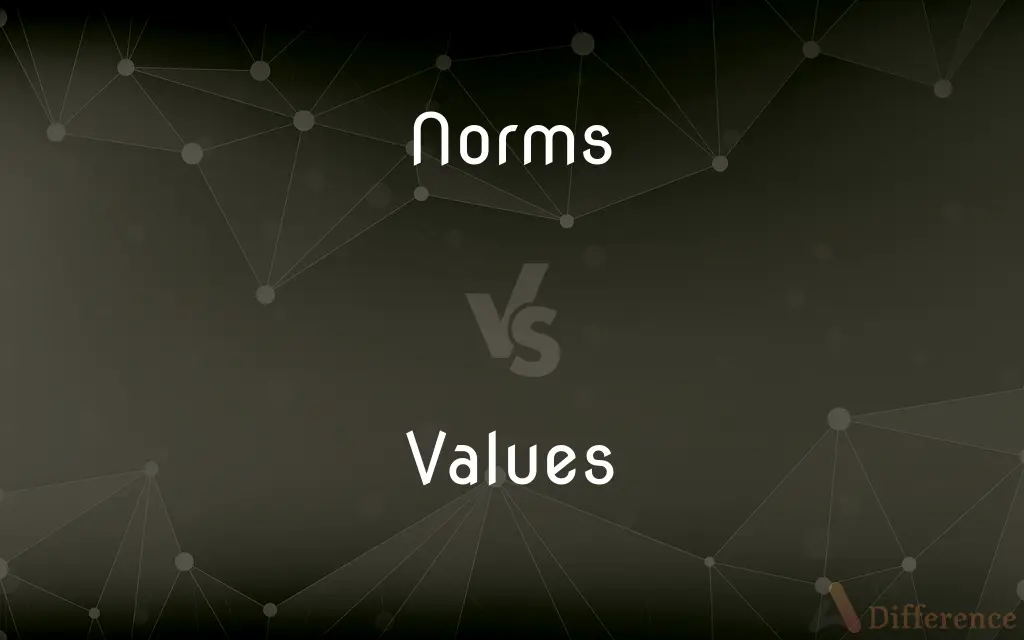Norms vs. Values — What's the Difference?
By Tayyaba Rehman — Published on October 17, 2023
Norms are shared expectations about behavior in a group; Values are shared beliefs about what is good or desirable.

Difference Between Norms and Values
Table of Contents
ADVERTISEMENT
Key Differences
Norms and Values are integral to understanding the cultural and social dynamics of any group or society. Norms provide guidelines on expected behaviors, while Values illuminate the underlying beliefs guiding those behaviors.
The concept of Norms is centered around the behaviors deemed appropriate or inappropriate in specific contexts. These can be formal, like laws, or informal, like etiquette. On the other hand, Values delve deeper, serving as the foundational beliefs or ideals that a society holds dear, such as freedom or respect.
Often, Norms evolve from established Values. For instance, if a society values honesty, a norm might emerge where lying is frowned upon. However, while Values usually remain steady over time, Norms can change as societal expectations shift.
It's essential to recognize that while Norms are about actions and behaviors, Values are inherently about beliefs. Values offer insight into what is prioritized or revered in a culture, whereas Norms provide a tangible roadmap of how to behave based on those priorities.
Although both Norms and Values play critical roles in shaping societies, they function at different levels. Norms dictate daily behaviors and interactions, while Values guide the larger ethos and principles of a group or culture.
ADVERTISEMENT
Comparison Chart
Definition
Shared expectations of behavior.
Shared beliefs about what is good or desirable.
Nature
Behavioral
Belief-based
Stability
Can change with societal shifts.
Usually consistent over time.
Origin
Often evolve from established values.
Derived from cultural, religious, or philosophical beliefs.
Manifestation
Observable in daily interactions and behaviors.
Reflected in shared priorities and principles.
Compare with Definitions
Norms
Guidelines that distinguish between acceptable and unacceptable actions.
In many societies, it's a Norm to offer seats to elderly people on public transport.
Values
Standards defining what is desirable or worthy of esteem.
For some, family is at the top of their Values list.
Norms
Patterns or traits deemed usual in a society.
In corporate settings, wearing formal attire is often the Norm.
Values
Fundamental beliefs guiding actions and judgments.
Many people uphold honesty as one of their core Values.
Norms
Behavioral boundaries set by societal consensus.
In some countries, tipping servers is a standard Norm.
Values
Ideals that provide direction and purpose in life.
Some individuals prioritize learning and growth as lifelong Values.
Norms
Standardized expectations about behavior within a group.
In many cultures, it's against social Norms to burp loudly in public.
Values
Moral codes or beliefs driving decisions and behaviors.
Environmental conservation is one of the Values many advocate for today.
Norms
Rules, often unwritten, that guide social behavior.
Standing in line and waiting your turn is one of the unspoken Norms.
Values
An amount, as of goods, services, or money, considered to be a fair and suitable equivalent for something else; a fair price or return.
Norms
Plural of norm
Values
Monetary or material worth
The fluctuating value of gold and silver.
Values
Worth in usefulness or importance to the possessor; utility or merit
The value of an education.
Values
Often values A principle or standard, as of behavior, that is considered important or desirable
"The speech was a summons back to the patrician values of restraint and responsibility" (Jonathan Alter).
Values
Precise meaning or import, as of a word.
Values
(Mathematics) A quantity or number expressed by an algebraic term.
Values
(Music) The relative duration of a tone or rest.
Values
The relative darkness or lightness of a color. See Table at color.
Values
(Linguistics) The sound quality of a letter or diphthong.
Values
One of a series of specified values
Issued a stamp of new value.
Values
To determine or estimate the worth or value of; appraise.
Values
To regard highly; esteem
I value your advice.
Values
To rate according to relative estimate of worth or desirability; evaluate
Valued health above money.
Values
To assign a value to (a unit of currency, for example).
Values
Of or relating to the practice of investing in individual securities that, according to some fundamental measure, such as book value, appear to be relatively less expensive than comparable securities.
Values
Relating to or consisting of principles or standards
A value system.
Values
Inflection of value
Values
Beliefs of a person or social group in which they have an emotional investment (either for or against something);
He has very conservatives values
Values
Principles held in high regard in a society or by individuals.
Charity and kindness are essential Values in many cultures.
Common Curiosities
Can Norms exist without Values?
Typically, Norms are derived from Values, but they can evolve independently based on changing societal expectations.
Are Values consistent across different cultures?
No, Values can differ widely across cultures, religions, and regions.
Why are Values essential to individuals?
Values provide direction, purpose, and a moral compass to individuals.
What are the primary purposes of Norms and Values in society?
Norms guide behaviors, while Values offer foundational beliefs that influence those behaviors.
Can Norms change over time?
Yes, Norms can evolve as societal expectations shift, while Values tend to be steadier.
Do Norms only govern negative behaviors?
No, Norms can dictate both positive and negative behaviors based on societal expectations.
Are Norms always explicit?
No, while some Norms are explicit, many are unwritten or informal but still understood.
How do Norms influence daily life?
Norms influence daily interactions, behaviors, and the way people respond to situations.
How do people acquire Values?
Values can be inherited, taught, or acquired through personal experiences and reflections.
How are Norms enforced?
Norms are enforced through social approval or disapproval, rewards, or even sanctions in some cases.
Are personal Values always reflected in societal Norms?
Not always. While societal Norms might be influenced by collective Values, individual Values can differ from societal norms.
Can a behavior be a Norm but contradict societal Values?
Yes, sometimes Norms can exist that might not align entirely with the broader Values of a society.
Can an individual's Values change?
Yes, individual Values can evolve based on experiences, learning, and personal growth.
What's a key difference between Norms and Values?
Norms dictate behaviors, while Values are about underlying beliefs and priorities.
Why is understanding societal Norms and Values essential?
Understanding Norms and Values helps in navigating social interactions and fostering mutual respect in diverse settings.
Share Your Discovery

Previous Comparison
Boolean vs. Binary
Next Comparison
Distress vs. SufferingAuthor Spotlight
Written by
Tayyaba RehmanTayyaba Rehman is a distinguished writer, currently serving as a primary contributor to askdifference.com. As a researcher in semantics and etymology, Tayyaba's passion for the complexity of languages and their distinctions has found a perfect home on the platform. Tayyaba delves into the intricacies of language, distinguishing between commonly confused words and phrases, thereby providing clarity for readers worldwide.












































